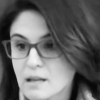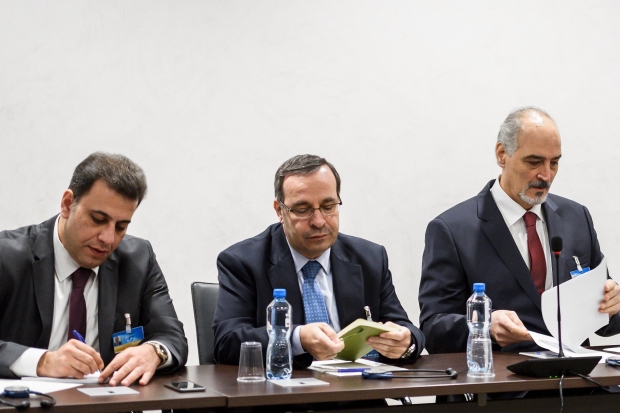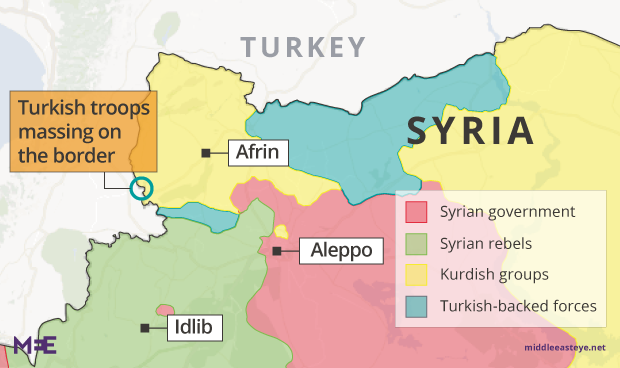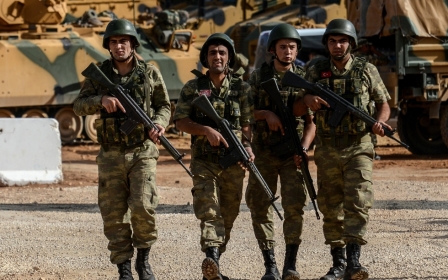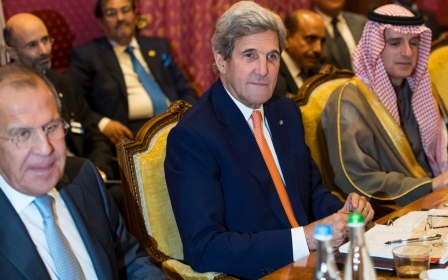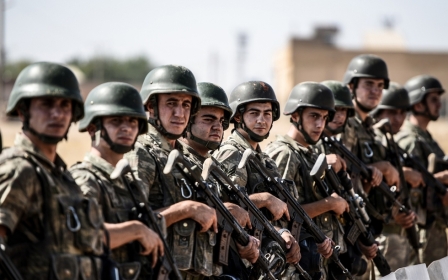Why the Kremlin's shadow looms large over the Syria peace talks
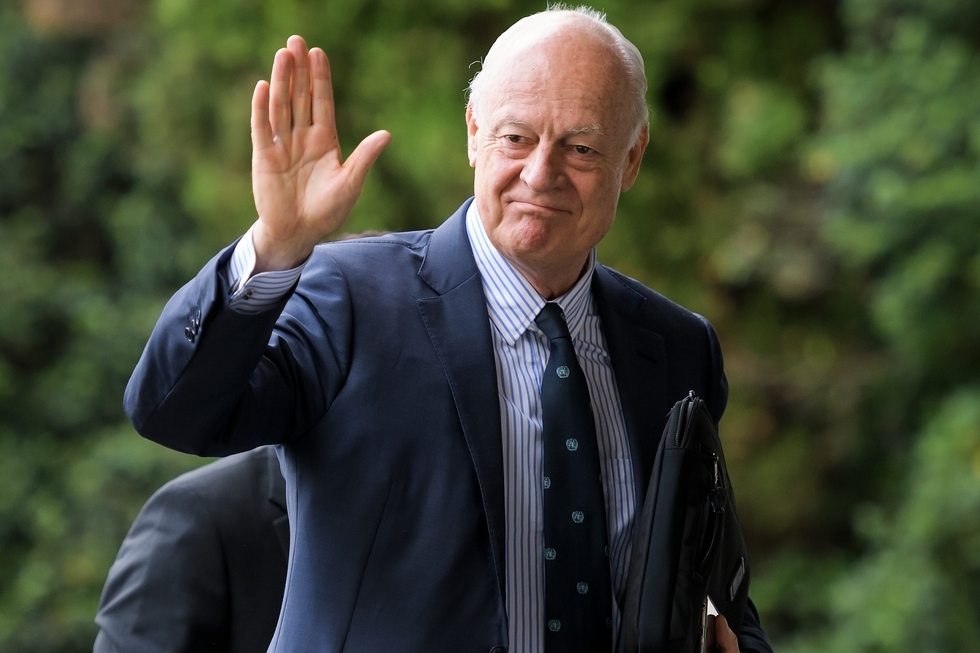
Just days before a new round of UN-sponsored talks and a national congress convened by the Russians in Sochi, the solution for the Syrian conflict looks more remote than ever before.
The past few days have seen all the factions on the ground intensify the violence, and their foreign patrons deploy additional military forces in a bid to strengthen their bargaining position ahead of the upcoming negotiations.
Palpable frustration
Turkey, a staunch ally of the Free Syrian Army, is getting ready to attack the Kurdish enclave of Afrin in northern Syria in response to the US decision to set up a new Kurdish-led border security force.
In the meantime, the Syrian government, backed by the Russians and Iranian militias, is conducting a new offensive in the north-western province of Idlib against what it describes as terrorist groups, displacing some 100,000 civilians.
Eastern Ghouta remains besieged, with some 400,000 Syrians trapped inside in desperate need of humanitarian assistance.
The government in Damascus rejected direct talks in the past saying the opposition was divided, its members were unknown or did not represent the people
The frustration is palpable at the United Nations in Geneva, the main host of the Syrian peace talks, where a new round is expected to start in the second half of January.
By the end of 2017, the UN diplomatic machine hoped the time had finally come for the Syrian factions to kick off the political process. The war was winding down, everyone said.
After three UN special envoys, five years of fruitless diplomatic efforts, the Islamic State on the run, the creation of de-escalation zones and Russia announcing a partial withdrawal of troops, the time seemed ripe enough for the warring parties to sit down and salvage what was left of the war-torn country.
Missed opportunity
In the last round of the Geneva talks in December, UN special envoy for Syria, Staffan de Mistura, flagged up a map of the war-ravaged country and pointed to a coloured patchwork of government-controlled areas, rebel enclaves, Kurdish territory and scattered zones under the influence of militant groups and foreign stakeholders, including Russia, Turkey and Iran.
"This is what nobody wants," the seasoned diplomat said, waving the map in the face of Ambassador Bashar al-Jaafari, the Syrian government's envoy to the peace talks. Jaafari wasn't happy, De Mistura said.
But the map served as a warning. With the Islamic State finally purged out of Syria, there was a window of opportunity to be seized without delay, De Mistura thought. Direct negotiations under the auspices of Security Council Resolution 2254 could kick off the political process before another wave of vicious violence erupted.
Dismembered as it looked on the map, Syria could either find a path to peace or continue to be a battleground, where the different factions and their foreign sponsors would eventually turn against each other. "We need to avoid another Libya, where after the war there was no political process," warned De Mistura.
But the eighth round was a "missed golden opportunity", as the senior UN diplomat put it at the end of three painful and unproductive weeks, in which both the UN mediators and delegates of the opposition waited for the Syrian government to show some goodwill, a genuine intention to find a way through the impasse.
Negotiations didn't take place in the end, not even indirectly. Despite an invitation to sit down without preconditions, the opposition made it clear from the start it wouldn't relinquish its demand for a removal of Syrian President Bashar al-Assad in a future transitional government.
The ongoing offensive on Idlib, the renewed US involvement, the new deployment of Turkish troops along the Syrian border are just the latest signs that the conflict is taking a further turn for the worse
This apparently triggered the government's decision to first delay its delegates' arrival to the talks and later seize on the statement by the opposition as an excuse to reject any further discussions.
De Mistura didn't hide his disappointment. The government in Damascus rejected direct talks in the past saying the opposition was divided, its members were unknown or did not represent the people.
A gloomy scenario unfolding
But this time, after a fruitful conference in Riyadh, the opposition had come united, with the so-called Cairo and Moscow groups - having a softer position towards Damascus - also present in the delegation.
"I told him - Ambassador Jaafari, let's try to be realistic," De Mistura said.
He continued: "You told me that you could not meet the opposition because they are divided, and that Moscow [platform] is not there, and Cairo [platform] is not there … now you have them all…'Mish kefaya’ [de Mistrua quoting Al Jafaari], not enough. We are talking to civil society; ‘Mish Kefaya’, not enough. We are talking to refugees, ‘Mish Kefaya’; not enough. We are talking to women's associations; ‘Mish Kefaya’, not enough. Obviously.
"There is never going to be [a] perfect [representation]. The perfect way to consult the Syrians will be through UN-supervised elections. Meanwhile I can tell you that the groups we are talking to represent a lot of people, never perfect, but let’s start talking with them."
The window of opportunity closed with a sense of frustration and failure, and the gloomy scenario everyone feared is now inevitably unfolding. The continuation, with no end in sight, of a conflict that has already killed half a million Syrians and displaced almost 13 million, five million of which are now refugees in neighbouring countries.
The ongoing offensive on Idlib, the renewed US involvement in support of the Kurdish fighters of the YPG whom Ankara considers terrorists, the new deployment of Turkish troops along the Syrian border are just the latest signs that the conflict is taking a further turn for the worse.
In particular, Idlib, one of the de-escalation zones where government and rebel forces were supposed to adhere to a ceasefire, is witnessing a resurgence of violence and air strikes that Damascus claims are targeting al-Qaeda-linked groups.
The rebels argue that civilians are the real targets and that children are being found under the rubble. In a statement last week, the Free Syrian Army (FSA) condemned the attacks by the Syrian government and its foreign sponsors, but has also accused the jihadist group Hayat Tahrir al-Sham, known previously as Al Nusra, of purposely provoking the reaction of the government with "fabricated battles".
Turkey has vowed it will support the FSA against both jihadists and government forces.
Peace talks at stake
Turkey, Russia and Iran created four de-escalation zones across Syria and act as guarantors of the ceasefires, but the agreement signed last May between the three countries may be shortlived. In this context both the UN-led talks, due to start on 25 January in Vienna, and the Syrian National Dialogue Congress due to be convened by the Kremlin in Sochi on 29 January, are at stake.
Russian officials said the congress is aimed at supporting the UN-led peace negotiations in Geneva, but the move has been perceived by the mainstream Syrian opposition as an attempt to boycott the UN peace track and legitimise the Syrian government.
The question is rather to which extent Russian President Vladimir Putin is willing to support or jettison the Geneva peace track
"The attack on Idlib and the siege of Al Ghouta by the Syrian government supported by Russian air cover, makes us doubt about the intentions of Russia in Sochi," said Yahya Aridi, the spokesman for the Syrian Negotiating Commission. "There is a huge tide of rejection by Syrians of Russia's proposal for a congress in Sochi. There is a perception it is just meant to rehabilitate the regime and legalise Russia’s occupation of Syrian territory."
Speaking to Middle East Eye, Aridi said Russian officials put preconditions to the opposition invited to attend the conference in Sochi, asking them to avoid any reference to the future of the Assad regime - a request that may compromise their attendance.
"These preconditions pre-empt the whole event. Russia said it will help the Geneva peace track for Syria, but Sochi will be sidelining the Geneva talks as well as the UN Security Council resolutions upon which a solution was proposed for Syria."
Aridi denied media reports alleging that the Syrian opposition was under pressure by the UN to attend Sochi. "Nobody is putting pressure on us to attend, but I think Russia is putting up a campaign to rally people to go.
"They are going to push people like cattle into this conference in Sochi and then call it a national dialogue. There will just be hundreds of the regime's supporters in order to rehabilitate [the government in] Damascus."
Keeping Geneva alive
The UN has not yet announced if Special Envoy De Mistura will attend Sochi. A spokesman said the envoy was still waiting to receive essential information about the contents of the conference and insisted that the only legitimate framework for discussions on Syria is the 2254 resolution under the auspices of the UN.
Despite the UN reluctance and public suspicion towards Russia's diplomatic effort, it looks inevitable that Moscow will define the blueprint of the solution to the Syrian quagmire.
The question is rather to which extent Russian President Vladimir Putin is willing to support or jettison the Geneva peace track. Russia's military support has allowed President Assad to consolidate his territorial gains and strengthen his negotiating position.
Many fear this has already compromised Geneva's plan for a transitional government that the opposition hoped would exclude the ruling president. However, the Kremlin is also aware that the persistence of Assad's rule and the continuation of the conflict may drive a new generation of Syrians into the insurgency.
The US disengagement hasn't helped keep Geneva alive. After helping drive out the Islamic State, the Trump administration is mainly focusing on containing Iran's influence, but it hasn't put its weight behind the UN-led process, leaving Russia a free hand.
- Barbara Bibbo is an Italian journalist living between Doha and Geneva. She has worked at Al Jazeera English for eight years, doing extensive research on international issues and world-leading figures for the Talk to Al Jazeera show. She started her career in print, as a correspondent for Il Messaggero Veneto, the Gulf News and Italian News Agency ANSA from the Gulf region.
The views expressed in this article belong to the author and do not necessarily reflect the editorial policy of Middle East Eye.
Photo: United Nations Special Envoy for Syria Staffan de Mistura arrives for a meeting during the Intra Syria talks in Geneva, on 1 December 2017 (AFP)
New MEE newsletter: Jerusalem Dispatch
Sign up to get the latest insights and analysis on Israel-Palestine, alongside Turkey Unpacked and other MEE newsletters
Middle East Eye delivers independent and unrivalled coverage and analysis of the Middle East, North Africa and beyond. To learn more about republishing this content and the associated fees, please fill out this form. More about MEE can be found here.


